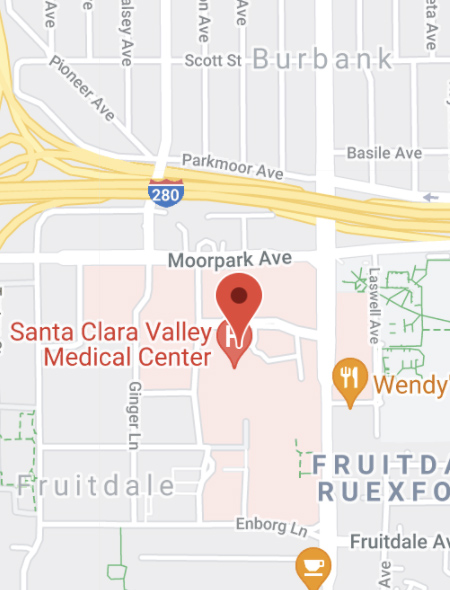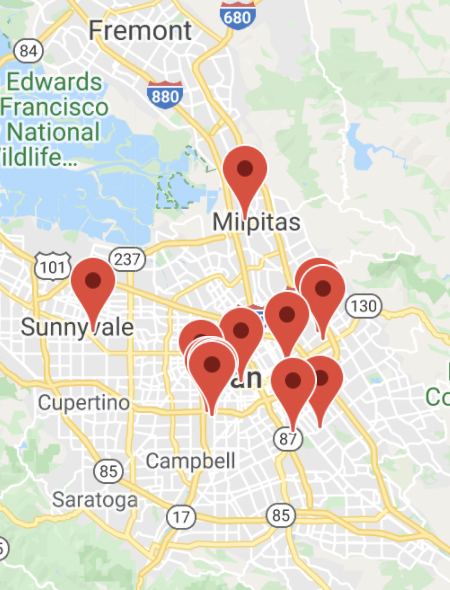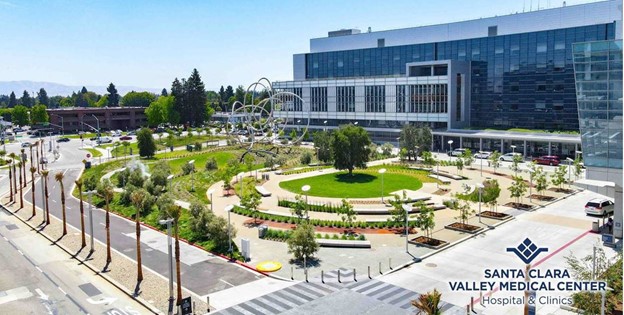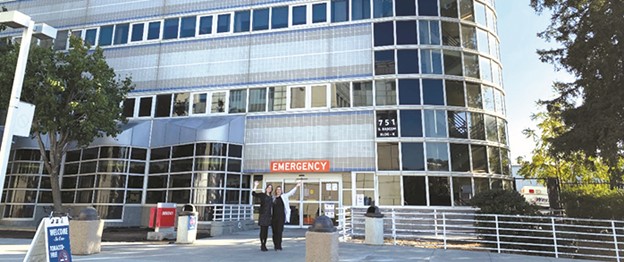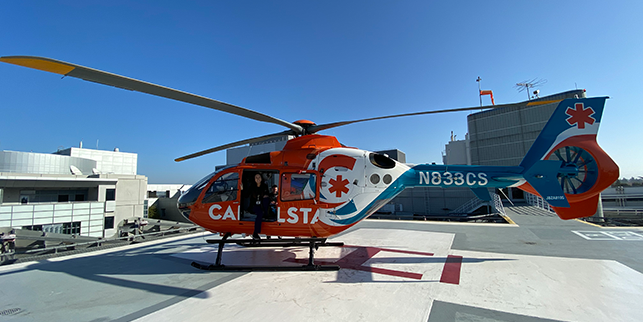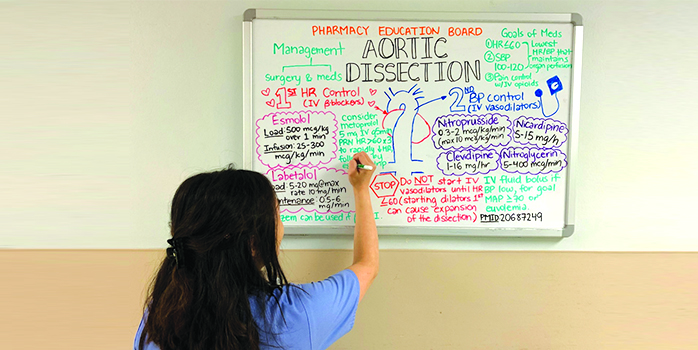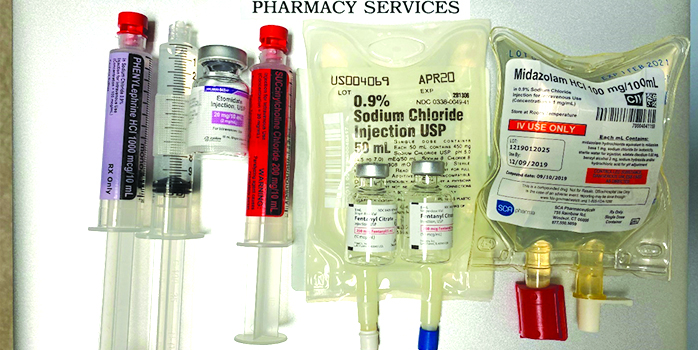Pharmacy Residency
PGY2 Emergency Medicine Residency
The PGY2 Emergency Medicine Pharmacy Residency Program welcomed its first resident in 2020 and received full accreditation by the American Society of Health-System Pharmacists (ASHP) in 2022.
The Residency Program Director is Raymond Chao, PharmD, BCEMP, BCPS, Inpatient Clinical Pharmacy Specialist and Michelle Ito, PharmD, BCACP is the Residency Program Coordinator.
For 2024-25, the program is recruiting one PGY2 emergency medicine resident.
PGY2 Emergency Medicine Residency Program
Santa Clara Valley Medical Center is a Level I Adult Trauma Center, Level II Pediatric Trauma Center, Regional Burn Center and certified Primary Stroke Center. Our emergency department treat an estimated 90,000 patients per year and is one of the busiest emergency departments in the region.
Our PGY2 Emergency Medicine Pharmacy Residency is a one-year postgraduate specialty training program that offers residents an immersive experience in all aspects related to emergency medicine pharmacy after they have completed a PGY1 residency.
The goal of the program is to build strong, well-rounded emergency medicine pharmacists via intensive training in all aspects of emergency care. As part of a county teaching hospital, the resident will be exposed to an extremely diverse population, obtaining experience in multiple emergency departments, as well as participating in pre–hospital and post-emergency department care.
Residents will complete training in pharmacy operations, required core rotations, and multiple elective rotations during the 12-month residency program. Our residency program partners with Stanford Hospital & Clinics to potentially offer one elective rotation to the emergency medicine pharmacy resident. The rationale for selecting the required rotations is to comply with ASHP standards and ensure that residents will acquire the necessary clinical skills to become effective practitioners of the future.
Residents are encouraged to select elective rotations that match their individual preferences, and which build upon past experiences. Required rotations and elective rotations are outlined below.
|
Required Rotations (9)
|
Elective Rotations**
|
Required Year-Long Longitudinal Learning Experiences
|
*Duration may be shortened if PGY1 residency completed at CSCHS
Residency Activities
Research Projects
Each PGY2 resident will be required to design and write a research proposal. If Institutional Board Review (IRB) approval is required, the resident will present to the IRB committee. The primary focus of the research project will be emergency medicine-related, with attention to an aspect such as quality improvement or cost savings. The Residency Program Coordinator, assigned project preceptor, and members of the Resident Research Subcommittee will guide the resident throughout the year with the intent of presenting the research results at ACCP (American College of Clinical Pharmacy) Annual Meeting or ACEP (American College of Emergency Physicians) Scientific Assembly and potentially the Western States Regional Residency Conference in San Diego, California. Residents will prepare a project manuscript and may submit for publication in a peer-reviewed journal.
Teaching
Our institution is affiliated with a variety of pharmacy schools. Dozens of pharmacy students per academic year complete their clinical clerkship rotations (APPEs) within our institution, thus providing the resident many opportunities to precept pharmacy students. We also have a robust PGY1 residency program. PGY2 emergency medicine residents will assist pharmacists in precepting students and PGY1 residents during their rotations. Additionally, our institution is a certified provider of continuing education for pharmacists; the PGY2 resident will be asked to present a continuing education program during the year.
Pharmacists are well-integrated into the multidisciplinary team in the emergency department. As the drug expert, pharmacists are often requested to share their knowledge with the other members of the healthcare team, including physicians, residents, nurses, physician’s assistants, respiratory therapists, paramedics, and students in a variety of formal and informal ways, such as inservices and whiteboard teaching.
All residents are invited to participate in the Teaching Certificate Program offered jointly by our institution and University of Pacific. Residents will improve their teaching skills through a variety of activities such as precepting pharmacy students/residents, participation in inter-professional activities, and participation in monthly teaching seminars. Upon completion of the program pharmacy residents will be issued a teaching certificate plaque by the University of the Pacific-San Jose Region. The program is optional for PGY2 residents who already have a teaching certificate from their PGY1 program.
Pharmacy Operations/Staffing
Residents will be required to staff approximately 32 hours/month in the emergency department. Staffing requirements are subject to change.
Committee Work
Residents will be required to attend monthly Emergency Department Staff and/or Critical Care Committee meetings. The resident must present and complete at least two emergency medicine focused quality improvement projects relating to the Committees. Projects may include developing clinical guidelines, performing a medication utilization review, and creating or updating Epic medication builds.
Regional & National Conferences
In November, residents may attend the California Society of Health-System Pharmacists (CSHP) Seminar, an annual four-day meeting where residents showcase their institution’s residency program to prospective applicants and have an opportunity to attend continuing education programs and develop networking connections.
In December, the American Society of Health-System Pharmacists (ASHP) Annual Midyear Meeting provides similar benefits to that of the CSHP meeting, except on a broader scale, as this is a national conference.
The emergency medicine pharmacy resident is encouraged to attend and present their research project at the ACCP (American College of Clinical Pharmacy) Annual Meeting or ACEP (American College of Emergency Physicians) Scientific Assembly. Residents are also encouraged to attend and present their research results at the Western States Residency Conference.
Conference attendance is optional but encouraged. The residency program reimburses residents for at least 50% of registration costs, but the program is unable to reimburse residents for airfare (mileage reimbursement for driving is available). Partial hotel reimbursement is often available as well, but not guaranteed. Conference attendance requirements may be tailored to fit the resident’s projects and interests.
QUALIFICATIONS FOR ACCEPTANCE
All applicants must fulfill the following criteria in order to qualify for acceptance into our PGY2 Emergency Medicine Pharmacy Residency Program:
- PharmD degree from an ACPE-accredited school of pharmacy
- Completion of an ASHP-accredited PGY1 pharmacy residency program or one in the ASHP accreditation process (e.g. – Candidate Status)
- Eligible for licensure in the state of California
- Demonstrate eligibility to work in the United States
- Favorable recommendation letters from clinical facility and/or former employers
- Demonstrate collegiality, clinical knowledge, interest in research, and motivation necessary for successful completion of residency training
- Completion of an interview with residency program coordinator, residency program director, director of pharmacy services, and preceptors
APPLICATION PROCESS
For any questions, all interested applicants should contact:
Raymond Chao, PharmD, BCEMP, BCPS
PGY2 Emergency Medicine Residency Program Director
[email protected]
Michelle Ito, PharmD, BCACP
Residency Program Coordinator
[email protected]
The PGY2 Emergency Medicine Pharmacy Residency participates in the ASHP Residency Match Program.
National Matching Services (NMS) Code: 627169
The following documents will be required of all prospective applicants to complete the application process. All materials should be submitted via PhORCAS:
- General PhORCAS application (including letter of intent)
- Curriculum Vitae
- Three references from clinical faculty and/or former employers. At least two of the three letters of reference must be from your PGY1 program. No supplemental letters are necessary; reference writers only need to fill out the PhORCAS reference form.
- A sample of your written work:
- Please submit a non-pharmacy-related “education board” on a topic of your choice – as a supplemental attachment via PHORCAS. See Twitter: @TILEDPharmD for examples, view past Pharmacy Education Boards via #pharmacyeducationboard. The goal is to educate the audience by simplifying a complex piece of information and making it easily understandable and visually digestible.
The deadline to submit the documents via PhORCAS is January 2, 2024.
Thank you for your interest in our program!
